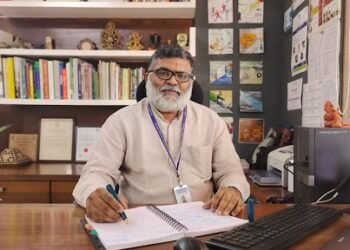
Development Alternatives (DA), a non-for-profit action research and development organization organized TARAgram Yatra -2012 in its campus Orchha, under Bundelkhand region in the state of Madhya Pradesh near Jhansi during 22 to 25 November.
The four day event showcased the achievement of the grassroots action in community empowerment led by woman. Development Alternatives choose very relevant topic for the this year event. The year of the focus of the mega event was on “Sustainable Development in South Asia-Woman Driving Change”.
TARAgram Yatra was an annual occasion that brought together practitioners and policy makers from different part of the world, particularly from India and South Asia region. The intention of the event was to discuss issues relevant to sustainability and help in designing programmes led by civil society actor, governments and regional network.
I was the part of Yatra at Orchha, where DA has various ongoing projects on sustainable development in villages. I visited some of the villages and saw ground reality of the projects and how the initiative are transforming lives of marginalized people of the region for last 25 Years. On 23 November there was beautiful exhibitions based on projects led by woman from the villages of the region.
DA has a technology villages-TARAgram Orchha (Tikamgarh) and TARAgram Pahuj, which are the Sustainablity Resources Centres for innovation, action, training and outreach in livelihood initiatives in the region.
Bundelkhand, in Central India, is one of the most backward region in the country in terms of economic and infrastructure development . This semi-arid region suffers from severe drought which has been aggravated by climate change, which has badly impacted the traditional occupations of the community. Agriculture productivity has gone down and the livestock affected by the lack of fodder and water. With hardly any industry, lack of proper infrastructure and low awareness on their rights and entitlement, the people of Bundelkhand are marginalized and are resorting the migrant labour as they have no livelihood option. This land is area that DA has committed itself to-its Karmbhoomi.
Continual poverty and environment degradation defines the challenges for which DA designs and delivers eco-solutions. Over 2 decade, DA has worked on the principle that people must be enabled and take charge of the their lives. Initiatives and project of DA are an excellent example of sustainable development particularly in rural area.
The area of the work of DA in Bundelkhand covers basic needs fulfillment, strengthening of institutions, natural resource management, promotion of clean and green technology, enterprise development and skill development and employability. Intervention in Bundelkhand were introduced by the DA based on the pressing needs felt by the rural communities. The uniqueness of the working model is to ensure community ownership of the initiatives.
DA has transformed villages into Model Villages-Humara Gaon (Our Village). It symbolizes the unified steps of the community members towards creating a model village, where villagers take charge of their lives while simultaneously realizing their responsibilities to themselves as well as the environment.
The focus of TARAgram Yatra 2012 was focused on empowering women to lead the world on the path of sustainable development. The event celebrated contribution that woman made to the economic, social and political lives of their community and families.
The road to women’s empowerment started back in 90’s by engaging in Bundelkhand Region in both Uttar Pradesh (UP) and Madhyapradesh (MP) with Self Help Group (SHG) formation and encouraging women to access alternative means of livelihoods.
Gender and development issues have revealed that one of the barriers to development here has been the underdevelopment of its women; and wherever women have had equitable access to education, economic opportunity and social support system, family and societies have benefited.
If we are to strive for development, then we will have to explore and support the positional of women to lead the process of the sustainable economic growth. Empowering women through education, capacity building, enterprise creation and leadership development supported by an enabling policy environment for mainstreaming their concerns thus becomes essential.
Also Read: “Responsibility is a New Opportunity”, Says Rusen Kumar at CSR International Conference
Here are key projects of DA aligned the “woman driving change”:
TARA Paper Unit- Empowering Women Through Social Enterprises
The TARA Paper Unit is a recycled handmade paper and paper products unit setup 15 years ago in 1996 in Orchha by DA under their sustainable livelihood program for Saharia Tribal women in the central India. The Unit is a social enterprise which operates on the triple bottom line principle-economic, social and environmental. It caters to the demand for handmade paper products, which is manufactured by treading cotton rags and other such waste material. The paper is not only made of recycled an waste materials; it crafted by the careful hands of highly skilled villagers, most of whom were, prior to their association with TARA, impoverished tribal women.
With 29 surrounding villages as the stakeholders, the unit has flourished and now employs more than 60 Sahariya women. Women working in the paper unit now feel that the business has increased their social standing and the income of the Sahariya tribal women has gone up to Rs. 3000 per month.
Empowering 11000 Women
DA, in partnership with NABARD and the State Govt of Uttar Pradesh and Madhya Pradesh, has been promoting women-based economic group in the semi-arid and impoverished region of Bundelkhand, Uttar Pradesh since 1986. In 2009, NABARD and DA came to a collaborative decision for taking up the formation and financial inclusion of 10,00 SHGs in the Bundelkhand region. SHGs project has reached 15 blocks in 7 district of Uttar Pradesh with the help of 14 Local NGO partners. More than 11000 women members are engaged in SHGs.
The initiative in the area provided the foundation for formation of the local NGO network which extended increased support towards formation of women’s Self-Help-Groups (HSGs) and extending their reach to microfinance. These HSGs are showing their potential in enhancing the suppressed voices of women, allowing them to partake in local decision-making and to be recognized as equal partners in the economic development of their villages.
Also Read: ASSOCHAM honors Rusen Kumar for remarkable contribution to CSR
60,000 Women Made Functionally Literacy
The TARA Akshar+ Literacy and Numeracy programme is an effective solution for helping illiterate woman learn to read, write and do simple arithmetic. Programme has had an enormous and far-reaching impact on the communities, particularly the women. Programme is implemented in 280 villages in 8 state of Northern India and more than 60,000 women made functionally literate. The programme teaches rural women to read and write, and comprehend basic calculation in 98 contact hours through daily two-hours class over 49 days. Thanks to programme, some of the women were members of the Panchayati Raj Institutions. Programme has made a phenomenal impact on the self-confidence and self-esteem of the women, enhancing their ability to participate in decision-making and public interaction.
Access to Justice for Rural Women
The subjugation of women is the traditional caste-based rural society is a well-known fact. Most initiatives towards rural development aim to increase the empowerment of women. The Tikamgarh (Madhya Pradesh) region is regarded as one of the most impoverished region. DA has identified civil society partners in the region and with their aid, local community member were trained as Paralegal Workers (PLWs) to increase awareness on rights and entailments amongst marginalized group, specially woman, and open channels to enable them to demand justice, when required. DA and its local civil society partners have trained 328 Paralegal Workers of which 215 are women. Program has covered 3000 women in 6 blocks.
Women Delivering Habitat Products and Services
The village were selected in Uttar Pradesh, Madhya Pradesh and Rajasthan to train women interested in being entrepreneurs. The initiatives undertaken by the DA were the result of the need to create, on a national level, mechanisms for the up-gradation of women’s roles in technical serves needed in habitats, to capitalize on country wide construction activities. Research project on the involvement of women in India as skilled labor in the construction sector and on ground implementation of skill up-gradation of women in habitat based products are two major initiatives in the field in the last three years.
About the author:
Rusen Kumar, Editor, IndiaCSR .
(www.indiacsr.in)






















